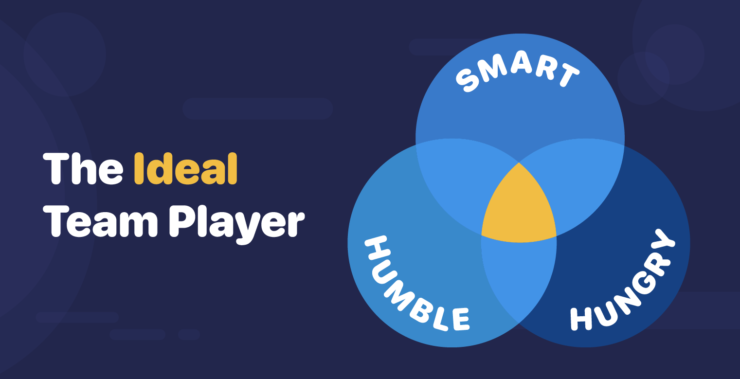Individuals make up teams, and the truth is that some people are better suited to contribute to excellent team performance than others. Some people may quickly offer substantial value to a team and require far less supervision and mentoring to be successful in their jobs.
Patrick Lencioni outlined the characteristics of an ideal team player in his best-selling book The Five Dysfunctions of a Team. It represents three virtues: humility, hunger, and smart people. This combination’s power dramatically speeds up and enhances the process of developing strong and hard-working teams.
Humble
Team members who are humble are ideal. They don’t have a lot of egos or care about their social standing. They are eager to acknowledge others’ achievements but shy to seek acknowledgment for their own. They share credit, place an emphasis on teamwork over individual achievement, and measure success as a group effort rather than an individual achievement.
Hungry
Ideal team players are hungry. They are continuously searching for new challenges, new things to learn, and new responsibilities. Hungry people rarely need to be encouraged to work harder by their bosses because they are self-motivated and conscientious. They’re always considering the next step and the next chance.
Smart
Smart team members are ideal. They are psychologically aware and have a good understanding of human behavior. They are usually aware of what is going on in a group setting and how to deal with others efficiently. They have strong instincts and judgment when it comes to the nuances of team dynamics and the influence of their actions and statements.
What does it take to be an ideal team player?
Being an ideal team player boils down to being a hard worker, prepared, motivated, and able to help the team no matter what comes your way.
The strongest team players in athletics are those that perform selflessly and make choices for the team’s benefit. In the workplace, the same ideas apply. It’s easy as an individual member to make choices based simply on your own requirements. Maybe you prefer certain activities to others because they have a greater career opportunity for you.
Even though these requirements should not be overlooked, they can not be seen as the be-all and end-all. In a group context, it’s critical to understand not only your own requirements but also those of your co-workers. When making judgments, consider the following.
- Does your team require your hard-working knowledge in any other areas?
- Will it create issues for others if you do not perform certain tasks?
- What can you do to assist the team in achieving its goals?
An excellent team player maintains a continuous balance between oneself and the team. Public acclaim is rewarding to them, but so is sharing the limelight with the rest of the team. And, like the finest athletes, they tend to lift others around them up and help them succeed. Here are five basic attributes of a team player:
Value collaboration
An ideal team player must understand that they will be asked to join others in making key decisions and bringing innovative thinking. In order for an effective team player to succeed, they need to offer creativity, effort, effectively communicate with others, get consensus for ideas, work hard, and build collaborative relationships across the organization.
Problem-solving trait
Being able to collaborate also entails being able to think critically and solve problems as they emerge. While problem-solving is frequently associated with projects or activities, it can also be applied to individuals.
In times of dispute, a great team player also serves as an excellent mediator. When team members aren’t on the same page, utilize active listening to your advantage. Consider both sides of the argument and strive to be objective and respectful of all viewpoints.
Reassure your colleagues that you’re all pursuing the same objectives. You may ensure that the dispute is beneficial rather than destructive by fostering positive motives from all parties. As a result, the team will be able to work hard together toward a more positive outcome.
Forward-thinkers and optimism
When teams do well, they have a positive outlook on the future. Great teams think tactically about their work and predict the activities that will contribute to the company. They are ambitious, competitive, hard working, and creative. They consider how their positions might expand in the future, as well as what their consumers will require in the future.
Reliability
Delivering what you said you would accomplish on schedule can make you an asset. It’s all too simple for some individuals to promise things they can’t do. Following through on what you say you’ll do may significantly surprise and impress people. Make sure to fulfill your promised commitments.
Being dependable extends to the work you provide for the organization. People will look to you for great work if you have high expectations. If you provide exceptional work one day and merely average work the next, the team may view you as unreliable.
They follow through on their objectives
Every member of the team must have a strategy in place to improve their talents in areas where they aren’t naturally strong. Individuals must have the correct mindset backed up by persistent behaviors to be good team members. How you interpret things about your role, as well as the activities you perform to assist the organization’s objectives, define effective collaborative efforts.
The Bottom Line
It’s not always simple to be a good team player. Teams are generally formed to handle tough challenges, and they are frequently subjected to tight timelines and budget constraints. However, this could be your opportunity to shine. Consider teamwork to be a fantastic opportunity as well as a struggle.
Utilize your abilities, be a hard worker, understand your position, and remain adaptable and dependable until the project is completed to assist your team. Maintain a good attitude and assist others as much as possible. You’ll create a great impression on everyone, including your boss, if you’re cooperative and eager to work hard.











Add comment